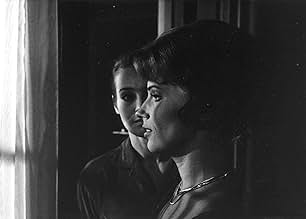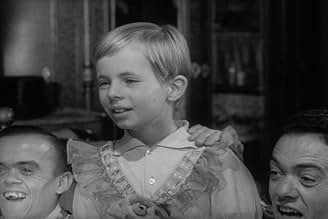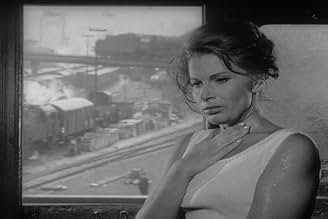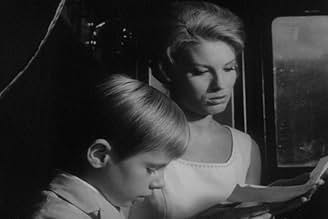Two estranged sisters, Ester and Anna, and Anna's 10-year-old son travel to the Central European country on the verge of war. Ester becomes seriously ill and the three of them move into a ho... Read allTwo estranged sisters, Ester and Anna, and Anna's 10-year-old son travel to the Central European country on the verge of war. Ester becomes seriously ill and the three of them move into a hotel in a small town called Timoka.Two estranged sisters, Ester and Anna, and Anna's 10-year-old son travel to the Central European country on the verge of war. Ester becomes seriously ill and the three of them move into a hotel in a small town called Timoka.
- Awards
- 3 wins & 2 nominations total
- Woman in Variety Hall
- (uncredited)
- The Paperboy
- (uncredited)
- Man in Variety Hall
- (uncredited)
- Impressario
- (uncredited)
- The Bar Owner
- (uncredited)
- The Doorkeeper
- (uncredited)
- Anna
- (uncredited)
- The Cashier
- (uncredited)
- The Old Man
- (uncredited)
- Director
- Writer
- All cast & crew
- Production, box office & more at IMDbPro
Featured reviews
The film also has one or two monumental pieces of cinematography - not least the scenes with the small boy in the large lobby of the hotel - far more effective in this film than in the "tribute use" by Kubrick in the Shining many years later. The shots of tanks rolling through the unnamed Southern European town will stick in my mind for a long time.
Ingrid Thulin and Gunnel Lindblom were two of Bergman's best women and he works with them to terrific effect in this movie.
This is one of the great movies - highly recommended.
Bergman's women shine in this film, too, although they must have been exhausted afterwards. Ingrid Thulin and Gunnel Lindblom star as the two sisters, whose apparent incestuous relationship has destroyed them both, Esther (Thulin) physically (she is dying) and Anna (Lindblom) mentally. They arrive, with Anna's son Johan, in a foreign city at war, which creates an uncozy atmosphere around Sven Nykvist's exterior shots. The tanks roll down the city streets, becoming a metaphor of the war of emotions between Anna and Esther. Thulin makes a very physically demanding performance, like Harriet Andersson in "Cries and Whispers" she is dying (of cancer?), and her pain is showing. Anna clearly wants to hurt her sister, who is the oldest and smartest of them, by saying cruel things and playing with Esther's apparent sexual love for her.
Sigmund Freud would have loved this film, and Anna seems to want to break free from her sister by having casual sex with a man she meets at a bar. She then tells her sister about it, and Esther's reactions to this is extremely ambiguous, like most of the film is. Anna's wish to become free of her sister is deeply rooted in childhood experiences, and it leads Anna to say things like "I wish she was dead" to the man who does not understand a word she is saying. All these things make "Tystnaden" the disturbing film it is. The only release is when Johan explores the corridors of the hotel alone, meeting a bunch of short men who perform at a circus-like variete Anna visits to escape from the sight of Esther. But Johan meets a kind (or is he a paedophiliac?) old man who works at the hotel, and it is he who has to care for Esther as she draws her last breaths, Anna tearing Johan away from her sister's arm in a very cruel manner. The long periods of silence in the film perhaps makes the title, or perhaps it means that the silence about the sisters' past is never broken to us, the spectators. A lot is left up to us to interpret, typically of Bergman's cinema.
All in all, a very ambivalent, Freudian and disturbing film from one of the masters of the cinema.
The film may be viewed on several levels -as the story of two sisters who apparently used to be close but are not able to communicate and understand one another anymore. Or it can be interpreted as a parable of Sensuality, Intellect, and Innocence, that cannot coexist in the world where God does not exist. As with every great and intelligent work of art, "The Silence" has so much to offer to its viewer, it's got so many questions to ask and it does not provide the easy answers.
Complex, suffocating, screaming through the silence, poignant, passionate, harrowing yet strangely hopeful and even funny sometimes - this is an unforgettable film, a masterpiece, a hidden treasure that has to be rediscovered and to receive as much praise and admiration as "Persona" and "Cries and Whispers" - for both of which "The Silence" was an inspiration. The acting by two Bergman's actresses is a miracle (as usual) as well as Sven Nykvist's camera work in creating the claustrophobic world where silence cries, whispers, and kills...
"Tystnaden" is a film about lack of connection and communication that in certain moments seems to be a silent movie. There are very few, but sharp and ambiguous, dialogs between the two sisters and it is not clear whether they had an incestuous relationship in the past and the weird way that Anna treats her son, sleeping naked in the bed with him or asking him to soap her back (at least, for non-Swedish viewer). The performances are awesome as usual in a Bergman's film, with wonderful black-and-white cinematography, use of shadows and camera work. My vote is seven.
Title (Brazil): "O Silêncio" ("The Silence")
Did you know
- TriviaThe language in the movie is Gun Grut Bergman's creation. She was a translator and linguist in Slavic languages. The name of the city, which is indicated first in the train's speaker, and then by Anna, as Timoka, is a real word however. Bergman found it in a book in Estonian on the bookshelf of his wife Käbi Laretei. When he asked what it meant, she replied "belonging to the hangman".
- Quotes
Ester: I didn't want to accept my wretched role. But now it's too damn lonely. We try out attitudes and find them all worthless. The forces are all too strong. I mean the forces... the horrible forces. You need to watch your step among all the ghosts and memories.
Ester: All this talk... There's no need to discuss loneliness. It's a waste of time.
- Alternate versionsThe original UK cinema release featured the pre-edited US print which was then cut by a further 35 secs by the BBFC to shorten some shots of Ester stroking Anna's hair and to replace subtitled references to erections and semen. The 1999 Tartan video is the complete version.
- ConnectionsEdited into Journal d un père (2023)
- SoundtracksGoldberg Variations, BWV 988 - Variatio 25
Music by Johann Sebastian Bach
- How long is The Silence?Powered by Alexa
Details
Box office
- Gross worldwide
- $14,199
- Runtime1 hour 36 minutes
- Color
- Aspect ratio
- 1.37 : 1



























